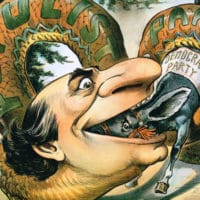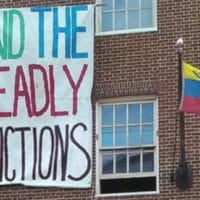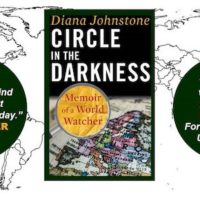-
Alone against the Virus
Decades of neoliberal austerity will make it harder to fight the COVID-19 pandemic. Now, more than ever, we must rebuild our social safety net and forge a New Deal for public health.
-
All too relevant: Marx’s critique of rights and neoliberal human rights
Jessica Whyte’s new book, The Morals of the Market, demonstrates the kind of scholarship we all aspire to: insightful, thought-provoking, and, above all, accessible and engaging. In it, she traces the “historical and conceptual relations between human rights and neoliberalism”.
-
Can Coronavirus force policy types to think clearly about intellectual property?
It will be hard to decide the most Trumpian moment in his dealing with the coronavirus pandemic, but my nomination is Trump’s meeting with executives from several pharmaceutical companies, where he discussed developing a vaccine. According to Trump, he asked them to “speed it up,” and they said that they would.
-
Letter from the great wound
These are miserable times. The statistics of deprivation and death are gruesome. Far too many people struggle with hunger; roughly nine million of them dying each year from complications due to malnutrition (a child dies somewhere in the world around every ten seconds because of this).
-
“Capitalism is a disease hotspot”
The real danger of each new outbreak is the failure or—better put—the expedient refusal to grasp that each new Covid-19 is no isolated incident. The increased occurrence of viruses is closely linked to the proliferation of capitalist food production and distribution.
-
The uses of “populism”
CLASS struggle occurs in the realm of concepts too. The World Bank for instance systematically counters Left concepts by employing a novel tactic: it uses the very same concepts as are used by the Left, but gives them a wholly different meaning; as a result they either come to mean something entirely different from what the Left had originally meant by them, or, at the very least, they become fuzzy and hence useless to the Left. In either case the power of the Left concept is neutralised.
-
United States Imposed Economic Sanctions: The Big Heist
The money trail of U.S. Sanctions leads to the Federal Reserve Bank of New York, which—behind the shadow of secrecy laws that effectively prohibit any form of public accountability—facilitates the theft of public wealth from targeted countries on a scale only previously accomplished through military invasion and occupation.
-
Re-enchanting the world: Silvia Federici on feminism and the politics of the commons
In her recent volume Re-enchanting the World: Feminism and the Politics of the Commons (PM Press, 2019), Silvia Federici fruitfully brings together feminist reflections with discussions of the commons as a possible way of overcoming capitalism.
-
“Absolute freedom of critique and discussion lies at the heart of the interests of the workers’ movement, and it must be pursued at all costs.”
On Rosa Luxemburg’s birthday, we present an extract from her 1906 essay “Critique in the Workers’ Movement,” available in English for the first time.
-
Johnstone brings her moral compass to our Dantesque world
It is one of the great personal accounts of the anguished decline of our uncivilization, both a riveting eye-witness account of many of the horrors and perfidies, and a primer for students of history and all those struggling to not only dismantle the beast, but to prepare us for what follows it.
-
We who were nothing and have become everything shall construct a new and better world
On 8 March 1917 (23 February by the old Julian calendar), a hundred women in the textile factories in Petrograd decided to go on strike; they went amongst the other factories and called their fellow workers onto the streets. Before long, around 200,000 workers–led by the women–marched through the streets.
-
Coronavirus: a disaster of capitalism’s making
What to do if confronted with an extremely contagious virus that medical experts say they have not seen before and don’t understand, and which is fast spreading and killing hundreds of people? a) Take precautionary measures to stop the virus spreading and prepare the health system for a potential shock? Or b) Ignore it, blithely assert – without any evidence – that it is little different from the common flu, accuse your adversaries.
-
No, the coronavirus is not responsible for the fall of stock prices
We are witnessing a big crisis in the stock markets of the Wall Street, Europe, Japan and Shanghai, and many blame the coronavirus for it. In the last week of February 2020, the worst week since October 2008, the Dow Jones fell 12.4%, the S&P 500 fell 11.5% and the Nasdaq Composite fell 10.5%.
-
Coronavirus: Bracing for the economic shockwave
The information-aware and many in the medical industry are nervously watching the news about coronavirus spread and mortality rates. What we know so far isn’t pretty.
-
Climate change and the class divide
No, we’re not all in it together. Our rulers are responsible for the system that’s creating an ecological catastrophe. As that crisis intensifies, it’s exposing and intensifying the divide between us and them.
-
A World no longer shaped by Atlantic powers
The annual Munich Security Conference that took place February 14-16 this year turned out to be an iconic event, drawing comparison with the one held in the same Bavarian city on February 10, 2007, where in a prophetic speech Russian President Vladimir Putin had criticized the world order characterized by the United States’ global hegemony and its “almost uncontained hyper use of force—military force—in international relations.”
-
Show me the words that will reorder the World, or else keep silent
On the night before Red Books Day, on 21 February 2020, in the Indian state of Tamil Nadu, N. Sankaraiah–one of the thirty-two founders of the Communist Party of India (Marxist)–read from M. Sivalingam’s new translation into Tamil of the Communist Manifesto. Comrade Sankaraiah, age 98, said that he had first read the Manifesto at age 18. Over the years, he returns to the book because each time he reads it the brazing prose teaches him something new. And something that–sadly–seems ageless.
-
Digital Workerism: Technology, platforms, and the circulation of workers’ struggles
The so-called platform economy–the distribution of, and access to work through websites and apps–continues to grab headlines and the imagination of policy makers, researchers, and journalists the world over. Much attention is given to its rapid expansion, its potential for further growth, and the large amounts of wealth generated through it.
-
Personal Data: Political persuasion
In the format of a guide and a visual gallery, Tactical Tech identify over 300 of the companies who offer their services to political parties, and give an in depth guide to thirteen of the key methods that are used to target and influence voters.
-
The problem with private property
The conceptualisation of property in a economic sense harks back to John Locke. These days property is commonly separated into four categories.




















